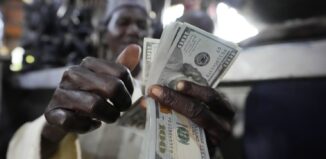The Presidents of African countries converged on Beijing last week for the 2018 Summit of the Forum on China-Africa Cooperation. President Muhammadu Buhari’s delegation included at least four state governors and seven federal ministers.
The highpoint of the summit was the Chinese President, Xi Jinping’s “promise” to provide fresh “assistance” of $60bn to finance infrastructure in Africa. This amount, according to Xi Jinping, would comprise $15bn of grants, interest-free and concessional loans, plus another $20bn of new credit lines. Furthermore, $10bn would be provided as special fund for development financing, while $5bn would similarly be advanced for financing imports from Africa. In addition, Chinese companies would invest at least $10bn in Africa within three years.
These “intervention” funds would not be applied, according to Xi Jinping, to the so-called vanity projects. However, some African countries would be exempt from payment of outstanding interest on loans which fell due by June 2018. Invariably, critics may see the Chinese largesse as akin to the United States Government Marshall Plan to revive Europe’s economies and repair the damage to infrastructure caused by the World War II between 1939 and 1945. Although Africa’s parlous infrastructure may not be directly attributable to devastation by strife, nonetheless misguided economic management, and corruption with intense treasury looting actively facilitated through ‘First World’ financial agencies, acting in concert with local collaborators, have invariably impoverished African nations, including Nigeria, such that, probably, less than one per cent of the African elite presently control over 80 per cent of the total wealth in most countries.
Admittedly, the $60bn Chinese “assistance” is quite substantial as it clearly exceeds the annual budget of the richest African nation. However, the amount may still seem grossly inadequate to address the infrastructural deficit in 54 countries with over 1.2 billion people. Notably, however, $60bn is probably much more than what Africa’s former colonial overlords provided for poverty alleviation in decades, even though such poverty level was arguably induced by an inequitable trade balance, which has antecedents in the slave trade era, when a human being could be exchanged for a vanity mirror and bottles of strong alcoholic beverages!
The Chinese president however assured his guests that “China does not interfere in Africa’s internal affairs and does not impose its own will on Africa; what we value is the sharing of development experience and the support we can offer to Africa’s national rejuvenation and prosperity”.
Africans may also be reassured by Jinping’s admonition, to officials of Chinese firms that “they had to respect local people and the environment where they operated”. This is clearly in contrast to the superior posturing of early colonial powers to people from the “Dark continent.” Nevertheless, Jinping’s admonition is timely as local media reports regularly decry the inhuman treatment of African workers by some Chinese employers.
Notwithstanding, the fear of China’s successful trade incursions into Africa probably compelled the unprecedented chain visits, this year, of (former) US Secretary of State, Rex Tillerson, President Emmanuel Macron of France, Theresa May of the United Kingdom, and Germany’s Angela Merkel to selected African countries, including Nigeria, to promote trade, economic and cultural relationships. Nigeria clearly remains a major attraction, with its abundant oil and gas deposits, with multiple other mineral resources and agricultural business opportunities for very profitable large scale commercial exploitation.
However, despite the seemingly charitable concessionary loans to Africa, some critics still advise that African leaders should closely look their gift horse in the mouth, so as not to be sold the dummy of a Trojan horse by the Chinese. It is remarkable, however, that rather than co-ordinate a harmonised transnational common African position, the umbrella Africa Union’s participation in discussions at the summit seems to have been, unusually, peripheral.
Nonetheless, Garba Shehu, President Buhari’s media and publicity aide, reported in a press statement from Beijing that China had executed infrastructure projects worth over $5bn across Nigeria since 2015, while Buhari also dismissed insinuations that Chinese loans to developing countries could constitute a debt trap. Conversely, Buhari insisted that the “vital infrastructure projects being financed by China actually synchronise with Nigeria’s Economic Recovery and Growth Plan. Besides, Buhari assured Nigerians that “some of the loans are self-liquidating”, and expressed confidence that Nigeria is able to “repay these loans as and when due”.
However, an updated report, culled, lately, from China Daily.com suggests that as of June 2017, “China had already invested a total of $22bn on physical infrastructure development projects, while another US$23bn worth of projects are ongoing in Nigeria.” These projects include, according to the report, the 312km rail route between Ibadan-Lagos, and 300km Lagos-Benin route, the 615km high speed Lagos-Abuja line, and the 675km Port Harcourt–Maiduguri line. Furthermore, Nigeria’s aviation sector also benefitted from a $500m loan from Chinese Exim Bank to construct new terminals at all four of Nigeria’s international airports. Other ongoing projects include $478m for a 300mw solar power plant in Niger State, and a $1bn Abuja-Ibadan-Lagos Greenfield Expressway. The nagging question, however, is whether these debt-funded facilities will be run as inefficient public utilities or concessioned at a giveaway cost to “selected” bidders?
The Chinese package also includes a subsisting US$6bn loan commitment which, apparently, overlaps with the $2.5bn swap deal designed to facilitate “settlement of Nigeria/China trade, so as to further increase exports from China”, even when Nigeria had paid over $14bn in 2017 for Chinese exports, when, conversely, our export to China still remains below $3bn.
Notwithstanding, it is clearly unexpected that neither the cost of these loans nor the tenor and other terms are available for public scrutiny. Besides, some of these Chinese loans were never formerly appropriated, and were therefore not subject to legislative appraisal. In this regard, we may, recall Vice President Yemi Osinbajo’s recent advice for thorough evaluation before endorsing the AfCFTA, as most treaties signed by Nigeria were, in his opinion, never subjected to thorough appraisal to guarantee that Nigeria’s interests were protected.
Arguably, employment and poverty levels may still not improve, significantly, throughout Africa, if projects related to the $60bn package will be largely constructed with materials and prefab modules from China, with Chinese workers, as bricklayers and other artisans, whose visa applications to Nigeria will now be authorised within 48 hours, under a new protocol. It is, however, not clear if the same visa protocol is also applicable to Nigerians travelling to China.
Although President Buhari appealed for reduced import duty on Nigeria’s agricultural exports to China, so as to increase our domestic output, we should be wary of ‘trade capture’ so as not to lose control over our food supply chain and our industrial and commercial subsectors to deep pocket Chinese businesses, heavily funded by Chinese banks which are now being established in Nigeria. Ultimately, Chinese businesses, with access to cheap export credit, will extend their tentacles into other sectors. Although President Jinping proclaimed a policy of “co-operation” rather than imperial control, it is fair to say that Chinese businesses are not charity foundations, in poorly regulated export markets.
Clearly, however, if Africa’s centuries’ old role as producer of primary commodities persists, despite these Chinese interventions, the gap in incomes and wages between Africans and workers ‘abroad’ will regrettably grow wider. Consequently, our goal must be to industrially process and increasingly add value to our primary produce before export.
Regrettably, however, the participation of Nigeria’s industrial subsector in adding value to our primary produce will remain modest, so long as businesses have to pay above 10 per cent interest rate to borrow. Furthermore, in view of Nigeria’s steeply rising debt burden, critical social infrastructure can be efficiently consolidated at NIL cost, through collaboration with local and foreign private sector concessionaires. Ultimately, with this model, increasing employment opportunities and government revenue sources will gradually evolve.
Nonetheless, we must interrogate why we increasingly seek foreign financial assistance, when in fact, our Central Bank of Nigeria’s major headache remains the “eternal” presence of excess money supply.
Copyright PUNCH.
All rights reserved. This material, and other digital content on this website, may not be reproduced, published, broadcast, rewritten or redistributed in whole or in part without prior express written permission from PUNCH.
source: punchng.com



